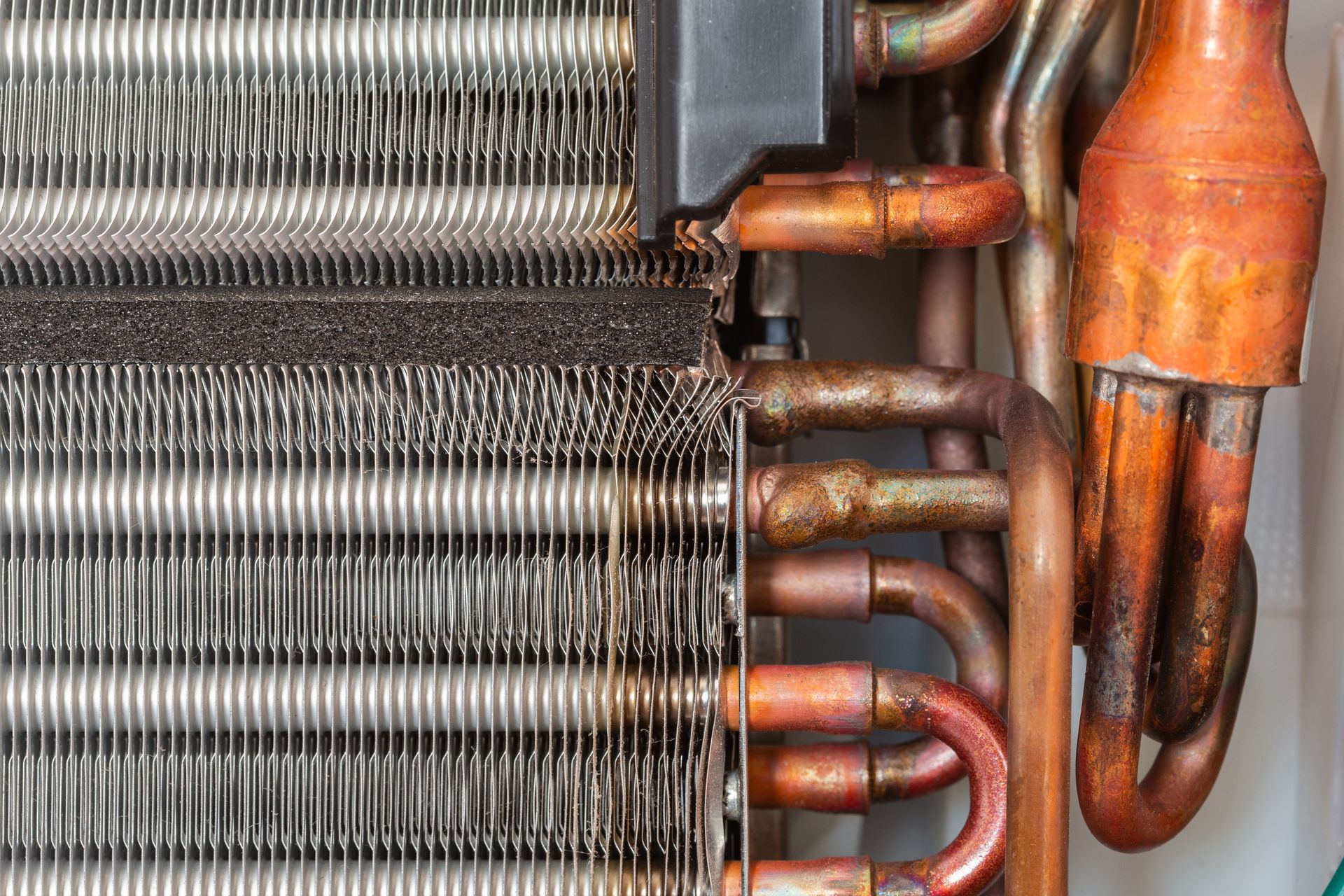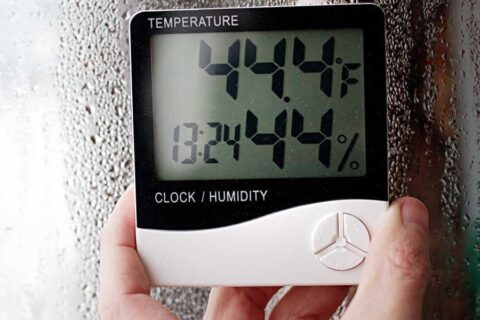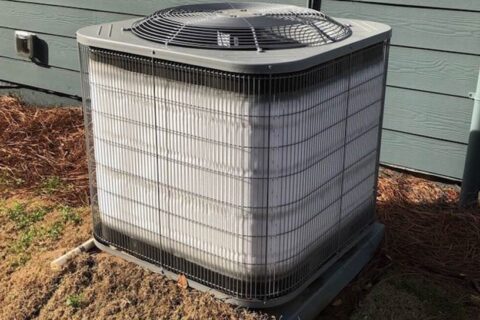10 Essential Tips for Maintaining Your AC Condenser Coils
Key Takeaways
-
By routinely cleaning your AC condenser coils, you’ll help your system operate more energy efficiently, save money on your energy bills, and cool your home more effectively. This will allow refrigerant to transfer heat more efficiently and stop your system from working itself to death.
-
When coils get dirty or clogged, they can cause you to experience poor cooling performance, odd sounds, and increased utility bill expenses. Keep an eye out for indicators such as ice formation or limited air movement to know when your condenser coil requires cleaning.
-
Always turn off power to the unit before cleaning it to ensure your safety. To clean your coil safely and thoroughly, make sure you’re using a coil brush and coil cleaner along with a garden hose. Always refer to your manufacturer’s recommendations.
-
Cut back any vegetation around the unit and make sure to keep the area free of leaves and litter. Doing so avoids the buildup of clutter that can impede airflow and overwork your HVAC system.
-
Replace air filters regularly and have a professional tuneup at least once a year. Professionals can deep clean and inspect for damage to extend the lifespan of your AC system.
-
Clean your coils 2x a year in spring and fall so they’re ready for the summer and winter peaks. Regular maintenance prevents the need for expensive repairs and it will help your AC run more efficiently all year long.
Properly maintaining your AC condenser coil is step one to ensuring your air conditioning system operates effectively and efficiently for years to come. Dirt and debris naturally accumulate on the coil over time, leading to lower cooling performance and increased energy costs.
Properly caring for your ac condenser coil will help your unit last longer and allow you to be cool and comfortable on the hottest of days. Follow these tips, and with a little time and a few inexpensive tools, you’ll save yourself expensive repairs and keep your home more comfortable.
Read on to learn our top 10 tips for maintaining your AC condenser coil. These tips are meant to be simple, practical steps that anyone can take, whether you own your home or apartment or you’re living in someone else’s space.
A few simple steps today will help protect your investment in tomorrow.
Why Maintain AC Condenser Coils
Make regular maintenance of your outdoor condenser coils a top priority to ensure your air conditioning system remains efficient, reliable, and cost-effective. Regular coil cleaning is imperative for the efficiency of your air conditioning units, especially during the summer when the demand for cool air peaks.
Improve Energy Efficiency
Clean AC condenser coils are more energy efficient due to better heat transfer. When coils get dirty or clogged, cooling efficiency goes way down, making the system work much harder just to keep up. You could begin to experience increased energy costs, lessened cooling ability or even ice forming on the condenser unit.
Unwanted sounds are another sign of unnecessary mechanical strain that occurs when coils are dirty. Routine maintenance can increase efficiency and save you up to 30% in energy costs. This saves you money and makes it a great investment for your comfort.
Extend Equipment Lifespan
When you keep condenser coils well maintained, you avoid premature wear and tear on your HVAC unit. Follow these tips to get started, but always begin by turning off the power. Remove dirt with a soft cloth, brush, or vacuum and for a more thorough clean, a specially formulated coil cleaner.
Gently rinse with water and remove any debris or vegetation around the spout. Replacing air filters and scheduling professional maintenance at least once a year are proactive steps toward maintaining energy efficiency. These measures not only prolong the lifespan of your system, but will help you steer clear from expensive breakdowns.
Reduce Repair Costs
Preventative care, including regular coil cleaning, is proven to save on repair costs by a large margin. Wear gloves and goggles whenever you handle air conditioner coils, avoid using harsh chemicals, and take care to follow manufacturer instructions. Regular maintenance helps avoid costly damages such as frozen evaporator coils that can lead to expensive repairs.
Ensure Better Cooling Performance
In addition to the energy savings, high-performing AC systems help keep us comfortable indoors when the outdoor temperatures soar. Basic tools like a coil brush, a garden hose with a spray attachment, screwdriver, and gloves should be all you need.
Cleaning coils yearly ensures smooth operation, better airflow, and consistent cooling. A cleaner system is the best way to prevent breakdowns when extreme heat hits.
Signs Your Coils Need Maintenance
Reduced Cooling Efficiency
If your AC is having a difficult time keeping your home cool, dirty condenser coils might be to blame. As time goes by, dirt, dust, and debris can accumulate on the air conditioner coils, significantly hindering their ability to transfer heat. This accumulation makes the system strain to operate, reducing its cooling capacity and overall system efficiency.
If your house isn’t quick to cool or heat, then something is wrong. Inspect the outdoor condenser coils for any buildup of dirt or other debris, particularly if some areas of your building are noticeably warmer than others. Regular coil cleaning, at least once per year, is essential to keep your system running at peak performance.
Spring and fall are ideal seasons to perform deep seasonal cleanings, ensuring smooth operation during heavy use times in the future. Additionally, inspect air filters at least every 30 days and change them out every 60 to 90 days to prevent dust and other debris from accumulating on your air conditioning coils.
Unusual Noises from the Unit
Strange sounds such as banging, rattling, or buzzing can be signs that your coils need some attention. These noises can be caused by obstructions around the fan or loose components. For example, dirt accumulation can block airflow, putting extra stress on the system.
A quarterly visual inspection can identify these issues before they become major headaches. Taking care of these signs at first notice will help you avoid larger, more expensive fixes.
Increased Energy Bills
If you notice a sudden increase in your energy bills, this is a sure sign that your coils have become dirty. In fact, research found that 60% of AC units have dirty coils, which can reduce efficiency by over 30%. If coils are covered with debris, the system has to work harder and use more energy to keep your building at the required temperature.
This higher workload increases costs and decreases the expected lifespan of the unit. Scheduling regular maintenance – like cleaning the coils and looking for signs of damage – can help save you big bucks on your bills.

10 Tips for Maintaining AC Condenser Coils
1. Turn Off Power Before Cleaning
-
Safety First Before performing any maintenance on your AC unit, be sure to disconnect the power source. Locate the disconnect box next to the outdoor unit and turn it off. Or, as a second option, you can turn off the breaker at your home’s electrical panel.
This is an important step in ensuring your safety while performing ac coil cleaning on the outdoor condenser coils.
2. Inspect Coils for Dirt and Debris
Over time, dirt, grass clippings, and other debris build up on the condenser coils. This buildup can restrict airflow and prevent the coil from transferring heat as efficiently as possible.
Consider spending a couple of minutes to give the coils a visual inspection and look for any visible buildup or blockage.
3. Use a Coil Brush for Cleaning
A soft-bristle coil brush is ideal for removing surface dirt without damaging the coil. Brush with the fins.
Brush in the direction of the fins so you don’t bend them. Don’t scour too aggressively or you can break the fins.
4. Apply Coil Cleaner for Deep Cleaning
For particularly caked-on grime, reach for a foaming coil cleaner formulated for AC condensers. Spray the cleaner thoroughly and evenly over all the coils.
Allow it to sit for the suggested duration to dissolve any grease and grime.
5. Rinse Coils with Water Carefully
Take your garden hose and rinse the cleaner off. Always direct the water downward so that you’re not forcing debris farther into the coils.
Steer clear of pressure washers, as the intense pressure can damage the fins.
6. Check Surrounding Area for Obstructions
Keep debris, plants, and other objects from obstructing airflow around the condenser unit. Things such as leaves, branches, or yard tools can block air flow.
So clear the space often.
7. Trim Vegetation Around the Unit
Vegetation growing too close to your AC condenser unit can block airflow. Provide proper clearance.
Keep at least two feet of clearance around the unit, trimming back vegetation and removing weeds.
8. Schedule Regular Professional Maintenance
Though you can do many steps yourself, nothing beats a professional air conditioning maintenance tune-up at least once a year. They can look for larger issues like dirty evaporator coils or worn parts that you may not be able to spot on your own.
9. Replace Air Filters Frequently
Additionally, dirty air filters can lead to a dirty ac coil, making your system work harder and causing unnecessary strain, which lowers overall efficiency. Replace disposable filters every 1–3 months, or clean reusable filters according to the manufacturer’s instructions.
10. Monitor for Signs of Wear or Damage
Watch for warning signs like strange sounds, lack of cooling, or water pooling around your AC system.
These may be indications that you need professional servicing to prevent larger problems down the line.
Safety Precautions for Cleaning Coils
Wear Protective Gear
Of course, protective gear isn’t always needed, especially when you’re using non-toxic cleaners such as Meyer’s All-Purpose Cleaner Spray or Purell. These are safe options and don’t involve the use of heavy-duty equipment such as hazmat suits or goggles.
If you are using compressed air or a fogger, be sure to wear gloves and protective eyewear. This will ensure you’re protected from unintentional exposure to debris or cleaning chemicals.
For instance, if you are using compressed air to remove stubborn dirt, the compressed air can blow dirt at high speeds, so gloves can protect your hands from cuts.
Avoid Using Harsh Chemicals
In addition, harsh chemicals can either corrode the material of the coil itself or be unsafe for the technician’s health. Avoid potentially harmful chemicals.
Stick to non-toxic cleaning options that get the job done without damaging the unit or your environment. For example, gentle sprays such as Meyer’s clean effectively while avoiding toxic vapors.
When in doubt, read the label to see what ingredients are included. Not only are these alternatives safer, they decrease the need for significant ventilation while cleaning, which makes the process much more convenient indoors.
Follow Manufacturer Guidelines
Each AC unit will have its own specific instructions, so be sure to read and adhere to them carefully. This will ensure that you’re cleaning coils properly and not voiding the warranty in the process.
Whether you’re using a shop vac to clear surrounding dust or compressed air to blow through the fins, follow the recommended angles and pressure levels.
A proper 90-degree angle is perfect so you don’t crease the fins while keeping them straight, allowing them to work efficiently.
Tools Needed for Coil Maintenance
Coil Brush and Cleaner
A coil brush is an indispensable tool for cleaning the condenser coil. This tool will safely remove unwanted dirt, dust, and debris from the delicate fins without damaging them. For really caked on dirt, use the brush in conjunction with a coil cleaner.
Coil cleaners, which you can get as a spray or foam, can help loosen that buildup. If you’re working with bent fins, a fin comb is a helpful tool for straightening them out and maximizing airflow. This simple, inexpensive, non-motorized tool probably isn’t in your toolbox already, so it’s worth ordering before you get started!
A dedicated shop vacuum with a wand extension is another convenient option for removing loose debris. Use it ahead of any cleaner you apply to speed up the cleaning process. If you’re working in cramped conditions, a flashlight will make it easier to see areas where cleaning is necessary.
Together, these tools help ensure your coil is clean and efficient.
Garden Hose with Spray Nozzle
A typical garden hose with an adjustable spray nozzle is highly effective at rinsing away all loosened dirt and cleaner residue. Select a nozzle with an adjustable spray setting for maximum control.
Stay with a low-pressure spray to avoid bending the coil’s fins. The flexible hose allows for a deep cleaning rinse, particularly for larger coils that cannot be physically cleaned by hand. Soap and a scrub brush are a good idea for really dirty spots.
Screwdriver and Protective Gloves
A screwdriver or drill will be necessary to remove the access panel covering the coil. This is an important step, as it provides you with direct access to the condenser unit for cleaning.
Protective gloves must be used at all times, as the fins and edges of the unit are sharp. Gloves protect your hands from the dirt and cleaning agents used while performing these tasks, making it a safer and more comfortable task to tackle.
How Often to Clean AC Coils
Learning how often to clean AC coils can go a long way toward keeping your system running at peak performance. Cleaning them annually, and more frequently if one is present, keeps your air conditioner running efficiently. With use, dust and debris naturally settle on your condenser coils, hindering their ability to transfer heat.
This accumulation makes the system work unnecessarily hard, which can result in increased energy costs and damage over time. Most homes won’t require more than one cleaning scheduled in spring each year. This gets them ready for summer when the AC is working the hardest.
If your system runs frequently, you should aim for cleaning it out every three months. Particularly if you live in an arid environment. For example, homes located close to active construction areas or with animal companions will experience quicker accumulation.
Prevent up to 90% of AC system failures by cleaning at this frequency high once every three months. One of the biggest causes of these failures is dirty coils. Including this task in your annual home maintenance ensures your home remains safe and comfortable while preventing surprise repair costs.
Although many homeowners perform basic cleaning on their own, hiring a professional helps to guarantee a deeper clean. Professionals have the tools and know-how to clean deeper, prolonging the life of your system. Routine seasonal HVAC check-ups are an excellent way to catch problems before they happen.
Conclusion
Proper ac condenser coil maintenance goes a long way Keeping your condensing coils nice and clean is crucial. It makes your system more efficient, longer-lasting and energy-saving. Routine maintenance will save you from expensive replacements, and will ensure your home remains a cool oasis throughout the hottest summer months.
Choose the right tools for the job, take appropriate safety precautions, and clean them regularly as necessary. It’s an easy annual practice that puts money back in your pocket while preventing a major headache in the future. Cleaner coils lead to cleaner air and lower energy bills, making it a solution that benefits everyone.
If you’re ever uncertain or need assistance, call a professional right away. There’s no better time than the present to take action and help prevent an AC emergency. Take it one step at a time, make it a habit, and reap the rewards of an efficient system that’s built to last. Just make the effort and your future self will thank you.
Frequently Asked Questions
Why is it important to maintain AC condenser coils?
Not only will proper maintenance keep your air conditioning unit running effectively, but regular coil cleaning services will also save energy costs and lengthen the lifespan of your system. Neglecting dirty ac coils can lead to insufficient cooling and increased utility costs.
How can I tell if my AC condenser coils need cleaning?
Symptoms of a dirty ac coil include a lack of cooling, increased energy costs, or strange sounds. Visible dirt or debris buildup on the air conditioning coils is a clear indicator.
How often should I clean AC condenser coils?
To maintain system efficiency, clean your outdoor condenser coils at least once a year. In particularly dusty environments or with regular use of your air conditioning unit, consider ac coil cleaning every six months.
What tools do I need to clean AC condenser coils?
You’ll want to be equipped with a coil brush, a vacuum with a soft brush attachment, a garden hose, and an available coil cleaning solution. These methods make for effective and safe ac coil cleaning.
Is it safe to clean AC condenser coils myself?
The answer is yes, but take safety precautions like ensuring proper airflow. Always turn off the power, wear gloves, and avoid strong chemicals. For major issues, call in professional HVAC technicians.
Can dirty AC coils affect energy efficiency?
You bet, dirty air conditioner coils make your HVAC system work harder, raising energy consumption and utility expenses. Regular coil cleaning helps your AC function at peak efficiency.
Should I hire a professional for coil maintenance?
If you’re not confident or don’t have the right equipment, call in a professional HVAC technician. They’ll have the know-how to perform thorough ac coil cleaning and leak checks.


